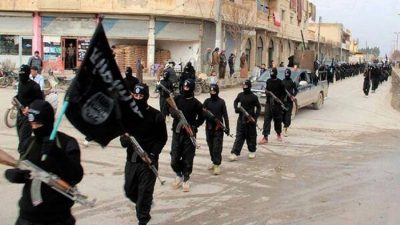By
Philipp Müller
In the aftermath of the terror attacks on Paris by the Islamic State (IS) on Friday, 13th November 2015, it has become more important than ever for European policymakers to determine how to deal with the threat posed by the IS. The French president Francois Hollande has announced to wage a ‘pitiless war’ against the IS and French aircraft have increased their bombing raids on IS-held territory in Syria. However, the IS has been the target of bombing raids by the United States air force for over a year now and shows no sign of collapsing.
European policymakers need to understand that the fight against the IS has to take place on two fronts: one is the “home front” in Europe and the other Syria and Iraq. The “home front” is the more important one from a European point of view. How can radical Islamists be stopped from carrying out more terrorist attacks in Europe? Several measures need to be taken. The first one is to re-establish border controls. The abolishment of internal borders in the Schengen zone only works on the condition that the external borders of the Schengen zone are well protected and controlled. This is obviously not the case and thus all European states should immediately re-establish their border controls. Several states, including Slovenia, Hungary, France and Sweden, have already done so, albeit only temporally in some cases. In order to control their borders properly, states have to increase the numbers of border control agents or use their armed forces to patrol their borders.
Secondly, European states need to increase the manpower of their security services. France is the most drastic example. French counterterrorism surveillance has identified 11,400 radical Islamists living in France. French Prime Minister Manuel Valls conceded that even keeping track of those suspected of being prone to violent acts is impossible: around-the-clock surveillance of a single individual requires ten to twenty security agents, of which there are only 6,500 for all of France.[1] The recruitment and training of enough new security agents will take years and thus must be started immediately. If necessary, radical Islamists, which are likely to conduct terrorist attacks, need to be deported or arrested before they commit atrocities.
Thirdly, European states need to better integrate their Muslim communities. Between a quarter and half of all Muslims in Europe agree that there is a conflict between being a devout Muslim and living in modern society.[2] European policymakers need to encourage and if necessary force the Muslims living in their countries to accept the supremacy of secular law over sharia law, the equality of men and women, freedom to change one’s religion (e.g. give up Islam without having to fear for one’s life), freedom of speech (e.g. being able to criticise or draw Muhammed without having to spend the rest of one’s life under police protection) and other European values. Who does not want to accept these values, should be encouraged and if necessary forced to leave Europe.
Fourthly, European states need to restrict Muslim immigration into their countries because the larger Muslim communities are, the larger the pool of potential recruits for radical Islamists. It is no accident that terror attacks by radical Islamists have taken place in Western European countries such as the United Kingdom, France, Spain and the Netherlands that have large Muslim communities. On the other hand Eastern European countries with very small or no Muslim communities have not suffered any attacks. The larger the Muslim community in a country, the higher the chance it includes radical Islamists and the higher the chance these radicals will receive financial and other support from the community and are able to recruit new members in the Muslim community.
As for fighting IS in Syria and Iraq, it is crucial for European policymakers to realise that no state has made the destruction of the IS their top priority. All the main actors in the Middle East see other enemies as more important. Bashar al-Assad’s main adversary are the Syrian insurgents in general — who are now also the main target of Russia, which has started to bomb Syrian rebel groups. The Lebanese Shiite militia Hezbollah is also supporting government of President Assad and fighting his Sunni opponents. For the Turks the main enemy are the Kurds. A victory of the Syrian Kurds over IS might allow the Kurdistan Workers’ Party (PKK) to gain a sanctuary, and resume its armed struggle against Turkey. The Kurds seek not to crush the IS but to defend their territory from it. They hope that the governments of Syria and Iraq will remain weak and unable to control the Kurdish area of their countries. They attacked the town Sinjar because it is in the Kurdish area but they will not attack Mosul, because that would be playing into Baghdad’s hands. For the Kurds of Iraq, the main danger is seeing a strong central government emerge in Baghdad, which could challenge the de facto independence of Iraqi Kurdistan. The IS stands in the way of the creation of any such strong government.
Neither are the Shiites of Iraq ready to die to reclaim the Sunni areas of Iraq. They will defend the Shiite areas of course but they are in no hurry to bring the Sunni minority back into Iraq’s political mainstream; if they did, they would have to share power with it. For the Saudis, the main enemy is not the IS, which represents a form of Sunni radicalism they have always supported, but Iran. The Iranians, for their part, want to contain the IS but not necessarily to destroy it: its very existence prevents the return of the kind of Arab Sunni coalition that gave them such trouble during their war with Iraq under Saddam Hussein. Then there is Israel, which can only be pleased to see Hezbollah fighting Arabs instead of Israelis, Syria collapsing, Iran, Turkey and Saudi Arabia mired in a proxy war in Syria and everybody ignoring the Palestinian issue. [3]
In short, no regional player is willing to commit enough of its forces to reclaim land from the IS. Neither are the Americans, the French or the Russians. The United States’ strategy is based on aerial strikes; Washington does not have the political will to send ground troops. Vladimir Putin, the Russian president, has also ruled out the use of Russian ground troops in Syria, just as President Hollande will not send French soldiers. Most Western leaders are not willing to fully cooperate with Russia, Iran and the Assad government against the Islamic State. Thus, the West will continue its restricted bombing campaign and limited support for local groups fighting the IS – the Syrian “moderate rebels” (in so far as they actually exist), the Kurds and the Iraqi government. But it is highly unlikely that these groups will be able to defeat the IS without the help of well-armed and trained regular infantry troops.
In the very unlikely case that an international coalition could be organised that would send enough ground troops to Syria and Iraq to defeat the IS, a military build-up of this scale would need months, which would give the IS leadership enough time to enact counter-measures, such as sending many of its international fighters back to their home countries in the Middle East, North Africa and Europe or to other failed states such as Libya, Mali, Yemen or Somalia. In the former these fighters could conduct terror attacks and in the latter they could take over territory and build up another Islamic State. The remaining IS fighters in Syria would undoubtedly prepare for a guerrilla war. In Afghanistan, after 14 years of fighting against Western troops, the Taliban were still able to take a major city like Kunduz this summer. This indicates that any guerrilla war would last decades. The aftermath of the invasion of Iraq showed that 125-170,000 American troops were not enough to occupy and pacify that country.[4] In February 2003, then-Army Chief of Staff Eric Shinseki told the Senate Armed Services Committee that “several hundred thousand soldiers” would be needed for the occupation of Iraq. In Bosnia, where Shinseki had served with the United States peacekeeping mission, the Pentagon had used a formula of one soldier for every 50 Bosnians. For Iraq in 2003, that calculation would have added up to an occupation force of 300,000 troops.[5] Today, Syria might have 18 million inhabitants, down from roughly 23 million when the insurgency started in 2011. The population of Iraq is estimated to be about 37 million, of which about 75% are Arabs (28 millions), of which in turn about a third are Sunnis.[6] Together, Syria and the Sunni regions of Iraq might have around 27 million inhabitants. According to the formula the Pentagon used for the peacekeeping mission in Bosnia, any coalition would need 540,000 soldiers in order to occupy and pacify Syria and the Sunni areas of Iraq. Which coalition of states is able and willing to keep so many troops in the field for such a long time and bear both the casualties and the financial cost of this war? In order to do so, Western states would have to re-introduce conscription and drastically increase their military budgets, from less than 2% of GDP in most NATO states to 5-10% of GDP. Despite the terror attacks in Western countries since 2001, the political will for such drastic measures does not exist.
Even if a sufficient number of soldiers, the necessary funds and the political will were available to destroy the IS and pacify the territory currently under its control, it would still not solve the underlying problem: governance. The American invasion of 2003 destroyed the Iraqi state and the civil war in Syria since 2011 eliminated state control in most areas of that country. The Sunnis in both former states are not willing to be governed by Kurds, Alawites, Shias or foreigners; they want to be governed by their own people. Outsiders cannot build up a state and create a legitimate government. Only the local Sunni population can achieve that but it would take many years and it might not succeed as the track record of Arabs to build prosperous, stable and fair societies is very bad indeed. This failure by the Arab elites is actually one of the main reasons why many Muslims join the IS, as the IS claims to build up a just, fair and prosperous new state and society.
However, even if the West were successful in destroying the IS in Syria and Iraq and the Sunni Arabs were to build up a functioning state, surviving IS fighters and other radical Islamists might create a new radical movement in another failed state and continue to spread their ideology among the Muslim populations around the world thanks to the internet. The West does not have the manpower or financial resources – not to mention the political will – to occupy and pacify all failed or failing states in the Muslim world. What the West can and must do is to stop destroying any more functioning Muslim states, and thus creating new failed states, as it did with the invasion of Iraq and the bombing of Libya in 2011. The West will have to learn to live with IS and similar groups, just as it learned to live with the remains of Al Qaeda. Remember, that the Islamic State was an offspring of Al-Qaeda in Iraq and in turn it could be the springboard for a new radical group if it were to be destroyed.
European policymakers need to focus on the measures outlined above to limit the threat of further terror attacks in their countries while recognising it is beyond the capacity of their military forces to completely destroy the Islamic State and its ideology.
[1] http://www.nybooks.com/blogs/nyrblog/2015/nov/16/paris-attacks-isis-strategy-chaos/
[2] http://www.pewresearch.org/files/2007/05/muslim-americans.pdf page 32
[3] http://www.nytimes.com/2015/11/17/opinion/the-attacks-in-paris-reveal-the-strategic-limits-of-isis.html?_r=0
[4] http://www.huffingtonpost.com/2008/04/07/a-timeline-of-iraq-war-tr_n_95534.html
[5] http://edition.cnn.com/2013/03/20/opinion/mills-truth-teller-iraq/
[6] https://www.cia.gov/library/publications/the-world-factbook/geos/iz.html



No Comments Yet!
You can be first to comment this post!